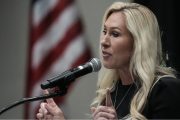Alan Gross, an American contractor who has been imprisoned in Cuba for more than four years, began a hunger strike last week to protest his treatment by both the Cuban and U.S. governments.
“I am fasting to object to mistruths, deceptions, and inaction by both governments, not only regarding their shared responsibility for my arbitrary detention, but also because of the lack of any reasonable or valid effort to resolve this shameful ordeal,” Gross said in a telephone statement to his lawyer that was released on April 8 by a U.S.-based public relations firm representing him.
“Once again, I am calling on President Obama to get personally involved in ending this stand-off so that I can return home to my wife and daughters,” he implored.
Gross was arrested in December 2009 for bringing satellite phones and computer equipment to members of Cuba’s Jewish community without the permit required under Cuban law. At the time of his arrest, Gross was working for a Bethesda, Maryland firm, Development Alternatives, which had a $6-million contract from the U.S. Agency for International Development (USAID) as part of a program funded under the 1996 Helms-Burton Act. Though Helms-Burton’s basic mandate was to seek international sanctions against the Castro government in Cuba, the funding for the program Gross was engaged in apparently came from part of the act authorizing U.S. support for “democratic and human rights groups.”
The Washington Post reported that since 1996, under Helms-Burton, Congress has appropriated more than $200 million for “democracy assistance” programs in Cuba and that USAID has been given considerable discretion in deciding what the money is used for.
Gross was charged with working for American intelligence services in January 2010. He was convicted of performing “acts against the independence or the territorial integrity of the state” in March 2011. He was sentenced to 15 years in prison.
Following his arrest by Cuban authorities, in June 2010, then-Secretary of State Hillary Clinton called for Gross’s release, but she instructed U.S. negotiators to convince the Cuban regime that his imprisonment “harms U.S.-Cuban relations,” rather than condemning the obviously trumped-up charges the Cubans used to justify his detention.
Former White House Press Secretary Robert Gibbs said in 2011 that Gross’s arrest “compounded an injustice suffered by a man helping to increase the free flow of information to, from, and among the Cuban people” and charged that Gross has been “unjustly detained and deprived of his liberty and freedom for the last 14 months.”
Last December, Gross sent a letter to President Obama, asking for his help in securing his release. He also spoke of the harsh conditions under which he is held:
For four years, I have been confined 23 hours a day to a small cell with two fellow inmates. I spend my one hour outside each day in a tiny enclosed courtyard. I don’t sleep much, between my arthritis and the lights in my cell, which are kept on 24 hours a day….
I have lost almost everything in the last four years, most of all time with my family — my wife, Judy, and my daughters, Shira and Nina. I have had to ask my daughters not to visit because I cannot bear them seeing me like this, a shadow of my former self, surrounded by men with machine guns….
Gross concluded by asking Obama to do more to secure his release:
With the utmost respect, Mr. President, I fear that my government — the very government I was serving when I began this nightmare — has abandoned me….
It is clear to me, Mr. President, that only with your personal involvement can my release be secured. I know that your administration and prior administrations have taken extraordinary steps to obtain the release of other U.S. citizens imprisoned abroad — even citizens who were not arrested for their work on behalf of their country. I ask that you also take action to secure my release, for my sake and for the sake of my family….
I have carried out missions on behalf of my country with pride, even in the face of risks to my safety. I did so because I believed in my country, in my government. I still want to believe that my government values my life and my service, and that a U.S. passport means something. I refuse to accept that my country would leave me behind.
Mr. President, please take whatever steps are necessary to bring me home.
Given the length of Gross’s sentence, his plight has faded from public attention for long periods of time. But even before his hunger strike, another situation focused a spotlight on him. A recent AP investigation revealed that USAID oversaw the creation of a Twitter-like social media network, ZunZuneo (or the “Cuban Twitter”) designed to “renegotiate the balance of power between the state and society” and to incite a “Cuban spring.”
However, the program came under heavy fire from Senator Patrick Leahy (D-Vt.), who said that ZunZuneo was a “cockamamie” idea doomed to discovery and failure. “This one from the get-go had no possibility of working,” charged Leahy. He called the project “dumb, dumb, dumb.”
Rajiv Shah, USAID’s administrator, said in response to Leahy’s accusations that the program was part of the administration’s efforts to provide new digital methods to increase the flow of information in and out of Cuba. He said the program was not covert, although “parts of it were done discreetly” to protect the people involved.
Leahy said USAID employees have been contacting the Senate’s oversight committee to complain that such secretive programs put them at risk because they create perceptions that the agency is engaged in intelligence-like activities. “We’re already getting emails from USAID employees all over the world saying, ‘How could they do this and put us in danger?’ ” said Leahy.
Gross’s lawyer, Scott Gilbert, also took the Cuban Twitter program to task, saying that it had put his client’s life in greater jeopardy:
Once Alan was arrested, it is shocking that USAID would imperil his safety even further by running a covert operation in Cuba. USAID has made one absurdly bad decision after another. Running this program is contrary to everything we have been told by high-level representative of the Obama administration about USAID’s activities in Cuba.
The Washington Post reported that even though Leahy has strongly criticized ZunZuneo, the program that led to Gross’s imprisonment, he has been equally critical of what he and others have called the Obama administration’s inattention to the case.
In a November letter to the president, noted the Post, Leahy and a bipartisan group of 65 other senators urged Obama to “act expeditiously to take whatever steps are in the national interest to obtain [Gross’s] release.”
Another letter, signed by a bipartisan group of 14 senators, led by Cuban Americans Robert Menendez (D-N.J.) and Marco Rubio (R-Fla.), urged Obama to “continue working for Alan Gross’ immediate and unconditional release.”
The communist regime that has ruled Cuba since the revolution led by Fidel Castro gained control on January 1, 1959 has often been a thorn in the side of the United States. The existence of this tyrannical state — once a surrogate state of the old Soviet Union — just 90 miles from Key West, Florida, has presented a real security threat to the United States. Our nation has also struggled with how best to accommodate the more than one million Cuban exiles who have fled from the communist regime. However, an inconsistent U.S. foreign policy not only helped bring Castro to power, but also helped keep him in power, and actually hampered the efforts of Cuban exiles to free their nation. The embarrassing, failed Bay of Pigs invasion in 1961 was perhaps the most conspicuous example of this foreign policy failure.
Humanitarian people sympathetic to Alan Gross’s plight will hope that our government will prevail in efforts to free this hapless victim of yet another botched government program.
Picture of rally for Alan Gross: AP Images
Related article: American Contractor Faces 20 Years in Cuban Gulag




